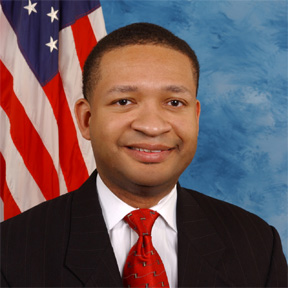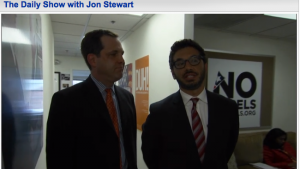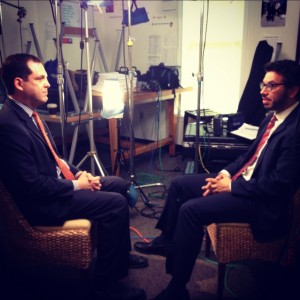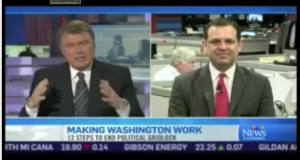Visit NBCNews.com for breaking news, world news, and news about the economy
|
Bill Bryant, host of “Kentucky Newsmakers” on WKYT-TV in Lexington, Ky., mentioned our own John Y. Brown, IV on his political news segment yesterday. Bryant referenced the “Why We Lost” piece JYB4 penned this week. Take a look: The Republican self-assessments, and the hardly disinterested kibbitzing from liberal pundits, are as scattered as would be expected in the wake of last week’s defeat. Some of the ideas have the virtue that they at least were not implicated in a 2012 strategy that failed. But in world where all rationalizations are not created equally, it’s worth dwelling on some of the more problematic pieces of advice floating around the atmosphere. Laura Ingraham, Ross Douthat and others have sounded the alarm that a Republican embrace of immigration reform, which they label presumptively as amnesty, will fail because Democrats will simply raise the bidding by promising Hispanics ever more government benefits and largess. They are right that immigration is no panacea. For one thing, any immigration reform remotely palatable to conservatives will not treat all undocumented immigrants alike, and the GOP’s likely preference for privileging families and long time residents will be challenged by Democrats who favor a dusted off version of the abandoned 2006 McCain Kennedy bill, which drew no such distinctions. An Obama Administration that clung to the position that virtually any state based immigration standards were illegal is extremely unlikely to accommodate the inevitable conservative preference for an approach more respectful of federalism. In other words, Republicans entering the immigration fight will not be greeted with an olive branch. But a softening of the Republican hard-line on immigration is frankly not about co-opting the left. It is, instead, recalibrating the GOP line so it is not so easily cast as a reflexive backlash at a surge in the Hispanic population. The orthodoxy in the Republican primaries and in the Fox universe was even in its best light, contradictory of conservative impulses: for example, an avowedly pro-family party was averse to making the consolidation of families a linchpin of immigration policy and a party that is determined to tie welfare benefits to responsible behavior seemed uninterested in a Dream Act aimed at promoting college attendance and enrollment in the military. An immigration view that seemed suspiciously adrift from the usual conservative values couldn’t help but be seen as a code for a much worse instinct. Of all of the left’s cultural bogeymen this past cycle—voter ID laws, Republican resistance to gay rights, and the anti-immigrant mantra—none affected a larger swath of swing voters than the immigrant bashing charge. A Hispanic electorate that barely gave Barack Obama 50 percent approval ratings for much of 2011 crested at 70 plus percent support for the president on Election Day. The size of the Hispanic deficit doomed Romney in Nevada and Colorado, and Democrats are right that a repeat in 2016 could arguably put Arizona and Texas in jeopardy. Join Obama’s grand compromise. There is much truth to the notion that Obama effectively framed this election as a choice between a middle class champion and a millionaire coddling plutocrat. To be sure, the Republican Party needs to shed its royalist economic image. While that likely does not mean embracing a breakup of big banks or the decentralization of the capital markets structure (Craig Shirley’s ideas in the Washington Post) it would make ample sense for Republicans to adopt the kind of smart, market oriented ideas Douthat and Reihan Salam have extolled for awhile, and as Governor Bobby Jindal proffered this week, to make that kind of conservative innovation a leading edge of the party’s rhetoric. But morphing into a more middle-class friendly party does not inevitably mean yielding on the cornerstones of the current economic debate, by acquiescing on Obama’s proposed tax hikes on the wealthy or retreating from a spending cut focused approach to downsizing the deficit. In fact, the compromise that a rising number of top rank CEOs are urging, letting go the Bush tax rates for earners above $500,000 in exchange for a phased in reduction of the corporate rate, is a classic example of a pragmatic seeming position that is actually quite deferential to the Republican donor base. The party’s donors and lobbyists would invariably trade a marginal rate boost that their accountants could trim away to holding the status quo on reams of corporate deductions. Hence, the weakness of cosmetic positions that are badly flawed in practice, but accomplish some strategic repositioning. It is actually to Mitt Romney’s credit that he rejected a quick-fix middle income tax cut during the primaries, and unlikely that a Romney embrace of the Simpson Bowles Commission would have done anything other than saddle him with rolling back the popular mortgage deduction. The impact of the Ryan Plan remains debatable, but given that seniors gave Obama a negligible edge on Medicare, one smaller than the Democratic edge on the subject in the last two presidential cycles, it is also a stretch to say that the shrewdest future course is silence on entitlements. Count on an increase in the GOP’s African American vote. Perhaps in the interest of holding ground on immigration and ceding an outsized Hispanic vote in perpetuity, there is an emerging school of thought that the easier route might be to target a notably higher African American vote than Romney’s 7 percent, which itself was an over-performance from summer polls showing virtually no black votes for Romney( not to pick on Douthat again, but there are strong traces of this analysis in his last column and it is an emerging favorite of African American Republican bloggers). The math seems unassailable. Running up the black vote to low double digits would do wonders to Republican numerical calculations for future races (or perhaps it would compensate for the unwisely understated assumptions this cycle about black turnout). The challenge for Republicans is that no nominee has reached those levels of blacks support since 1972 and only George W. Bush in 2000 has crossed the ten percent line, and then only barely. There are usually two dubious assumptions at the base of an African American strategy for Republicans. The first, that the near monolithic black vote is a function of a superior outreach machinery by Democrats, and that Republicans could lessen the gap with a more assertive deployment of advertising or social media. Second, the idea that there is a suppressed black conservative vote that could be activated by more artful use of themes like opposition to same sex marriage. Both theories downplay the extent to which the black advantage for Democrats is a reflection of one community’s entrenched skepticism of the Republican label as well as its considered judgment that active Democratic style government intervention is in its best interest. That mindset is only hardened by the near universal belief in black circles that Obama has faced uniquely vigorous opposition from Republicans for racially tinged reasons. A Republican candidate who came to verbal blows with the Tea Party and the GOP’s southern wing and who was an avowed moderate would have a head start on gaining ground with blacks; so for that matter would a socially conservative Democrat who criticized, say, gay influence in the Democratic Party have a running start at securing more white Southern evangelical support. Neither variant has a remote shot of emerging in the current left-right duopoly of American politics. Absent the wildly improbable, or the inclusion on a Republican ticket of Condi Rice, there is no empirical reason to think that in the short term, Republican percentages in the black electorate would rise more than a point or so to average post Nixon levels. (In fact, a smaller black turnout post Obama would wipe out the gain from returning to Bush 2000 support levels). These aren’t disastrous ideas—don’t over-assume the benefits of a turnabout on immigration; lose the image of being the party of No; and rediscover the tradition of Lincoln—but they miss in different ways what, in the context of race, conservatism has done to itself and in the context of economics, the nature of the cards we are dealt. This road back is a long one. (Cross-posted, with permission of the author, from OfficialArturDavis.org)
My wife had a habit of hiding my new light weight robe from me. Not really hiding it so much as wearing it herself whenever I seem to be looking for it. And not just my robe but the occasional comfortable pull-over shirt too for relaxing around the house. But can I turn the tables on her? No! I can’t fit into her thick over-sized Terrycloth robe. Not that I have tried….heck, it doesn’t even look comfortable. And as for stealing my wives comfortable shirts and blouses—-or about any other article of clothing? What do you think? It appears to be just another unfair double standards of the sexes we men have to accept . ; ) Need we say more?
Q: I’m a first-time candidate. After guiding me to victory in my primary, one of my chief strategists asked me to hire his ne’er-do-well son. The son was a campaign volunteer and got along well with everyone, but I turned down the request. I didn’t want to start out my career like that. Did I make the right call, or did I make an enemy for life? Both. Q: Does direct mail still work? Is it a good use of money relative to other forms of communication, like TV, radio or knocking doors? Increasingly, no. There are some places it still works, though. Rural Missouri and St. Louis’ southern suburbs, for instance, are home to large concentrations of seniors, some of whom rarely leave the house, aren’t online except to use email, and for whom snail mail is a highlight of the day. Parts of the outer boroughs in particular also have high concentrations of elderly residents. Of course, in rural Missouri, television buys are cheap. And moving images (TV ads) are generally more effective/persuasive than mail. So TV is preferable to mail there. But in a legislative race in the outer boroughs, New York City media market TV buys aren’t feasible, so mail is a decent option. Radio is often a good option for negative ads, since listeners tend to forget the source of the attack and thus don’t hold the attacks against the candidates making them to the same degree they would with a television spot, for instance. But again, this is prohibitively expensive for legislative and City Council candidates in the New York City market. Upstate, it is much more feasible. Of course, having someone actually talk to voters is always preferable to mail, radio or TV. But some areas are remote and/or difficult to canvass because of the distance between homes. And even in areas that can be canvassed effectively, some campaigns lack volunteers. They may employ paid canvassers as a substitute, but that can be dicey: Those jobs typically pay approximately $10 an hour or even less, and sometimes paid canvassers have more legs than teeth. My chief opponent in a congressional primary used an oxymoronically named D.C. firm called Grassroots Solutions that hires paid canvassers. They were so stupid that they picked the only day of the entire election cycle when you know who is actually going to vote—Election Day—and spent the morning waving signs outside my office instead of at poll sites talking to voters. So be cautious about hiring anyone who claims they’ll help create “organic” grassroots support. In sum, yours is a question with which every campaign must grapple. Except in anomalous areas like senior-heavy sections of the outer boroughs, money that once went toward mail will largely be steered toward online advertising in the future. In addition to the Internet’s status as a place where people spend more time than the 15 seconds it takes them to go from the mailbox to the trash can, the Web provides ad buyers information about the number of people who actually see and click on an ad, which mail is unable to do. In a metrics-obsessed Moneyball world, tools that enable campaigns to gather information while assessing the effectiveness of their messaging are increasingly essential. Read the rest of…
As Madrigal exposed, No Labels — the national grassroots movement I co-founded, that involves 600,000 Democrats, Republican, and Independents in efforts to promote problem-solving to replace hyper-partisanship — is really a front group for immigrant harassment, forced Chick-fil-a feeding, and spinning in circles. Or something like that. When the show was first run, I tweeted my commentary simultaneously. You can read my wacky insights by clicking here. So if you missed it last night; now, here’s my moment of zen: Having trouble accessing the video? Click here to watch on The Daily Show Web site.
While The RP (Jonathan Miller) appears on The Daily Show, he will be live tweeting. Read the feed below as The RP implodes on national TV. And join in the taunting and teasing by tweeting from your personal account with the hashtag #RecoveringPol.
Yep, you read that right.
Tonight at 11:00 PM EST, I will be appearing on one of my all-time favorite television programs: The Daily Show, starring Jon Stewart, on Comedy Central. Daily Show correspondent Al Madrigal interviewed me this summer at the No Labels headquarters in Washington, DC for a segment on hyper-partisanship. I had planned to make a passionate case for Make Congress Work, our 12-point plan to help transform Washington from hyper-partisanship to problem solving. Of course, this is Comedy Central. And we spent about three hours in an “interview” that can only be characterized as a comedy improv session. I had to comply with 2 rules: No jokes. No laughing. And that was a lot more difficult than it sounds — Madrigal and his crew are really, really funny.
If you’d like to experience the show with me — virtually speaking — I will be running a live feed of my spontaneous tweets here at this site as the show runs tonight at 11. You can join me with your comments, critiques, and put downs (keep it civil!) by using the hashtag #RecoveringPol from your personal Twitter account. Your comments will appear live aside mine here at The Recovering Politician home page. If you are fast asleep at 11 — don’t worry, there will be many other chances to watch me implode on national television. The show will re-run again tomorrow (Friday, November 16) at 1:00 AM, 10:00 AM and 7:30 PM (all EST). And, of course, I will have the clip up here at The Recovering Politician as soon as technology permits. So join me tonight (or tomorrow) on The Daily Show. It could be the last time you will ever see me in public…
To sign onto the No Labels’ plan to Make Congress Work, click here and add your energy to the growing movement which now includes nearly 600,000 Democrats., Republicans and Independents, all who believe we must occasionally put aside our labels to do what is right for our nation. And for The RP on CTV News, let’s go to the videotape: |
| ||
| Copyright © 2026 The Recovering Politician - All Rights Reserved | |||
















